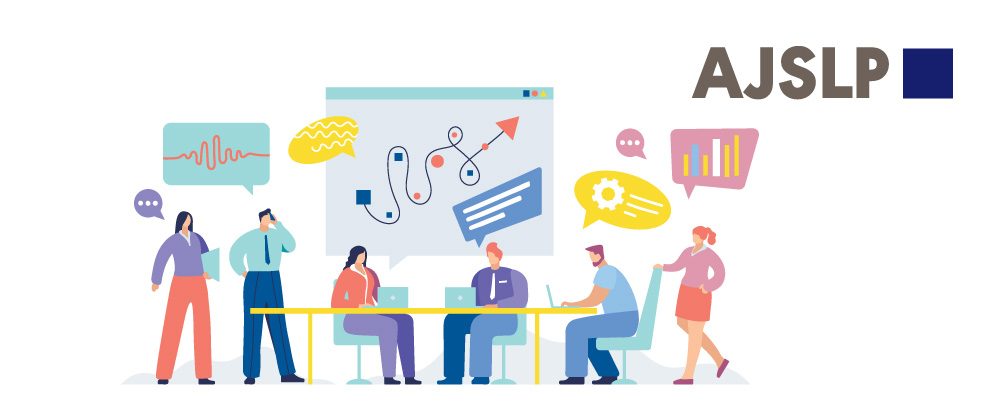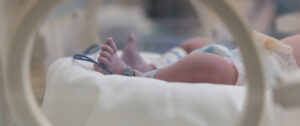Here at the ASHA Journals, we’re all about solving problems. The traditional research pipeline of relying on randomized clinical trials can often seem frustratingly slow. At the same time, clinicians in audiology and speech-language pathology are often looking to incorporate evidence-based practice (EBP) into their daily work. The latest forum in the American Journal of Speech-Language Pathology (AJSLP) offers a solution to each of these problems.
In this forum, “Clinicians and Researchers Navigating Implementation Science in CSD,” the authors showcase recent efforts by researchers and clinicians to collaborate for the good of the population that both groups work to serve. Guest Editors Meghan M. Davidson and Megan A. Morris have produced a forum of 10 articles highlighting collaborative efforts and encouraging readers to consider how they can incorporate implementation science into their work—regardless of their occupational setting.
Starting Where You Are
The forum opens with an introduction by Davidson and colleagues. The authors acknowledge that one of the hardest parts of collaborating is getting started, so they offer one simple suggestion: Start where you are.
An article by Douglas and colleagues presents a scoping review of implementation science in communication sciences and disorders (CSD). The authors note a marked increase in implementation science articles in CSD since 2014, and they present future directions for implementation research. In addition, Douglas joins Binger and Kent-Walsh for a tutorial showing how to integrate implementation science into your research using readily available tools.
Implementation Science in the Community
In the schools, researcher–practitioner partnerships may vary depending on the size of the organization. An article by Alonzo et al. looks at how one group of researchers collaborates with school-based practitioners in (1) a single school, small school district and (2) a large school district.
Two more articles focus on addressing disparities in children. Magnusson and colleagues highlight the creation of a decision support tool to help professionals and caregivers proceed once a developmental concern has been noted. Later, Quinn et al. used feedback from caregivers to modify a proposed telepractice protocol for children with language delays who live in rural areas.
More Implementation Science in Action!
Three articles discuss implementation science efforts to help people who use augmentative and alternative communication (AAC), people with aphasia, and children who are deaf or hard of hearing. First, Caron and colleagues describe an online training program that aims to help practitioners better provide literacy instruction for people who use AAC.
Next, Tierney-Hendricks et al. researched whether or not SLPs working with people with aphasia were implementing a whole-person approach to aphasia care. Then, Studts and colleagues tested a behavioral parent training intervention specifically designed for children who are deaf or hard of hearing.
Starting Where You Are: Taking the Next Steps
In their epilogue to the forum, Davidson and Morris write that researchers and clinicians at all career stages should “think about, plan for, and evaluate implementation of effective interventions that have a real-world and lasting impact for individuals with communication and swallowing disorders” (Davidson & Morris, 2022, p. 1185). We hope that this forum gives you both the inspiration and the tools to do just that!
Want to know more about implementation science? Check out the implementation science resources from the Clinical Research Education (CREd) Library. The links and articles featured can help you at any stage of your implementation science journey.
We’d like to thank Guest Editors Meghan M. Davidson and Megan A. Morris for their work putting together this forum. You can learn more from them by checking out the video below!
Explore the Forum
Alonzo, C. N., Komesidou, R., Wolter, J. A., Curran, M., Ricketts, J., & Hogan, T. P. (2022). Building sustainable models of research–practice partnerships within educational systems. American Journal of Speech-Language Pathology, 31(3), 1026–1038. https://doi.org/10.1044/2021_AJSLP-21-00181
Binger, C., Douglas, N., & Kent-Walsh, J. (2022). Planning for implementation science in clinical practice research: An augmentative and alternative communication example. American Journal of Speech-Language Pathology, 31(3), 1039–1053. https://doi.org/10.1044/2021_AJSLP-21-00085
Caron, J. G., O’Brien, M., & Weintraub. R. (2022). Online training to improve service provider implementation of letter–sound correspondence instruction for individuals who use augmentative and alternative communication. American Journal of Speech-Language Pathology, 31(3), 1114–1132. https://doi.org/10.1044/2022_AJSLP-22-00009
Davidson, M. M., Alonzo, C. N., Barton-Hulsey, A., Binger, C., Bridges, M., Caron, J., Douglas, N. F., Feuerstein, J. L., Olswang, L., Oshita, J. Y., Schliep, M. E., Quinn, E., & Morris, M. A. (2022). Prologue: Implementation science in CSD and starting where you are. American Journal of Speech-Language Pathology, 31(3), 1023–1025. https://doi.org/10.1044/2022_AJSLP-22-00009
Davidson, M. M., & Morris, M. A. (2022). Epilogue: Implementation science in CSD and starting where you are. American Journal of Speech-Language Pathology, 31(3), 1179–1187. https://doi.org/10.1044/2022_AJSLP-22-00010
Douglas, N. F., Feuerstein, J. L., Oshita, J. Y., Schliep, M. E., & Danowski, M L. (2022). Implementation science research in communication sciences and disorders: A scoping review. American Journal of Speech-Language Pathology, 31(3), 1054–1083. https://doi.org/10.1044/2021_AJSLP-21-00126
Magnusson, D. M., Shwayder, I., Murphy, N. J., Ollerenshaw, L., Ebendick, M., & Auer-Bennett, E. (2022). Creation of a community-driven decision support tool for caregivers of children with developmental concerns. American Journal of Speech-Language Pathology, 31(3), 1084–1094. https://doi.org/10.1044/2021_AJSLP-21-00072
Quinn, E. D., Cotter, K., Kurin, K., & Brown, K. (2022). Conducting a community engagement studio to adapt enhanced milieu teaching. American Journal of Speech-Language Pathology, 31(3), 1095–1113. https://doi.org/10.1044/2021_AJSLP-21-00100
Studts, C. R., Jacobs, J. A., Bush, M. L., Lowman, J., Creel, L. M., & Westgate, P. M. (2022). Study protocol: Type 1 hybrid effectiveness–implementation trial of a behavioral parent training intervention for parents of young children who are deaf or hard of hearing. American Journal of Speech-Language Pathology, 31(3), 1163–1178. https://doi.org/10.1044/2022_AJSLP-22-00009
Tierney-Hendricks, C., Schliep, M. E., & Vallila-Rohter, S. (2022). Using an implementation framework to survey outcome measurement and treatment practices in aphasia. American Journal of Speech-Language Pathology, 31(3), 1133–1162. https://doi.org/10.1044/2021_AJSLP-21-00101







